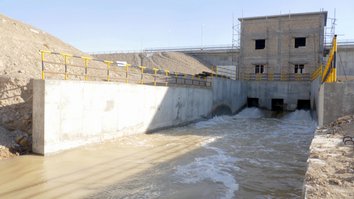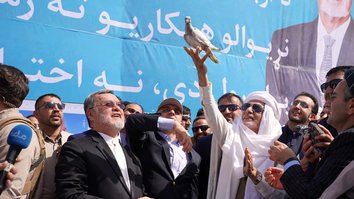KABUL -- The days of Iran siphoning off free water from Afghanistan are numbered, according to President Ashraf Ghani.
Excess water will no longer freely flow to the neighbouring country once the facility is up and running, vowed Ghani, who visited Nimroz Province on July 26 to check on the progress of construction of Kamal Khan Dam on the Helmand River.
Iran captures thousands of cubic metres of water daily in excess of the 1973 Helmand River Treaty, which covers water use.
Afghan officials have repeatedly accused Tehran of supporting the Taliban to prevent the construction of dams in the western region of the country and to ensure the continuation of water flows into Iran.
![This photo taken July 26 shows a part of Kamal Khan Dam under construction on the Helmand River in Nimroz Province. [Afghan Presidential Palace]](/cnmi_st/images/2020/08/03/25278-k_6-585_329.jpg)
This photo taken July 26 shows a part of Kamal Khan Dam under construction on the Helmand River in Nimroz Province. [Afghan Presidential Palace]
![President Ashraf Ghani arrives July 26 at Kamal Khan Dam in Nimroz Province to check on construction progress. [Afghan Presidential Palace]](/cnmi_st/images/2020/08/03/25279-k_2-585_329.jpg)
President Ashraf Ghani arrives July 26 at Kamal Khan Dam in Nimroz Province to check on construction progress. [Afghan Presidential Palace]
"Our running water is our pride, and in a few years, Afghans will re-own billions of cubic meters of water that we had lost ownership of," Ghani told hundreds of listeners in Zaranj, the provincial capital.
The construction budget of Kamal Khan Dam is $78 million (5.9 billion AFN), funded through the government’s development budget.
With the capacity of irrigating 80,000 hectares of land and generating 9MW of electricity, the dam's inauguration is scheduled four months from now.
In addition, the dam will curb the risks of flooding in Nimroz, Ghani said.
'Water belongs to Afghans'
Work on the dam is continuing even as Iranian officials make contradictory claims over water rights.
Iran needs more water from Afghanistan for environmental purposes, said Abbas Araghchi, the Iranian deputy foreign minister for political affairs, in an interview with TOLOnews on July 19.
"There is a water right for Iran, and there is a water right for Afghanistan, and then there is a water right for nature," he said. "Nature's share must be also given. If we want to avoid the consequences of environmental erosion, we must give nature its share."
"There are Hamoun lakes that are partly located in Afghanistan and partly in Iran. These lakes must be filled to play their role in the environment of the region," Araghchi added. "If these lakes are left dry, they will have environmental consequences for both countries."
If Afghanistan blocks water to the Hamoun lakes by building dams, it will have negative consequences for itself as well, he claimed.
However, the Iranian official's comments contradict the 1973 Helmand River Treaty.
Iran has "no claim to the water of the Helmand River in excess of the amounts specified in this Treaty, even if additional amounts of water may be available in the Helmand Lower Delta and may be put to a beneficial use," stipulates the treaty.
The Iranian regime has always used threatening language about water issues with Afghanistan, which shows clear interference in Afghan affairs, said Ghulam Faruq Rasib, a civil society activist in Herat city.
Iranian officials' open talk of taking more water than the treaty permits clearly demonstrates their hostility toward dams and water management in Afghanistan, he added.
"The Iranian consulate in Herat has blocked a public road for years, while its government shows no flexibility but very shamelessly asks for more water from the Helmand River," he said, referring to road construction that has stalled because the consulate refuses to move its front wall.
Boosting the economy
Meanwhile, for residents of Nimroz Province, the inauguration of Kamal Khan Dam will signal the realisation of a 54-year dream. Construction on the facility, which started in 1966 and halted because of conflict, resumed in 2011.
Kamal Khan Dam will be very positive for the economy of Afghanistan, especially for Nimroz Province, said Jan Mohammad Alokozai, a resident of Zaranj.
"Kamal Khan Dam will create many jobs. It is also useful in producing electricity and will meet some of the demand in Nimroz Province," he added. "Agriculture productivity will ncrease from the water from Kamal Khan dam."
"Once Kamal Khan Dam is inaugurated, thousands of hectares of open land will be cultivated, providing work for thousands of farmers," said Javed Bahrami, another resident of Zaranj. "When there is water, Nimroz will be a producer of wheat and other farm products, transforming human lives.
Those sentiments were shared by Nematullah Sediqi, member of the Nimroz Provincial Council.
"The inauguration of Kamal Khan Dam will be a great day for the people of Nimroz, and a day of happiness for farmers," he said.








Your youths love to go to Syria because of their belief. We don’t send any one by force.
Reply15 Comment
Even though Kamal Khan Dam has not been completed yet, Iran should thank God that only a few drops water run to this country. Up to now there are 10 dams, which are under construction, and by the end of 2021, many other dams will be completed in Afghanistan, and it will make half of the population of Iran migrate to Afghanistan
ReplyThere are 5 million Afghan refugees in Iran. If they return, it is enough for us.
Reply15 Comment
Afghanistan has lacked a strong leader in its domestic and foreign policies for the past many years, and this lack of leadership has pushed Afghanistan and Afghans back in all affairs of life, and even some enemies are proudly saying that they pushed Afghanistan back for hundred years, because of this lack of good leadership, the enemy could: made the tribes fight against each other, undermine the economy of Afghanistan, hinder and delay the extraction as well as proper use of Afghanistan’s mines, caused insecurity, and different kinds of miseries, such as ethnic, zonal and racial differences, Finally the two spiteful and corrupt countries (which are interfering in the affairs of Afghanistan) never want that Afghanistan and its various tribes stand on their own feet again. If these two spiteful countries or at least one of these two had a good sense of neighborliness, their feelings would have been a source of today and tomorrow’s pride in the history of both countries. They should know well that neither the language of history is dumb and nor its eyes are blind. Right will always find its place, even if it is weak. 59959
Reply15 Comment
The owner of Afghanistan's water is neither Iran nor nature. If water does not reach the environment beyond the country’s borders, it will harm the environment. So if we are the owner of our water and it flows out of the country, then the environmental process will be harmed on this side of the border as well. When Iran does not give us oil for free, then why should we give them our water for free, which is a more valuable resource? Ashraf Ghani said that he would not leave it unless he takes oil from them instead of water.
Reply15 Comment
The dam will make the country green and prosperous. Similarly, it will provide employment and at the same time, our agricultural products will increase. We won’t be needy to other countries. Thanks to the president. Now it is time to take our right from the neighboring countries. If we can also prevent the water of Amu River, we will have green and prosperous Afghanistan. Iran will also destroy the dam by Taliban. I hope the government strictly ensure the security of the dam as well.
Reply15 Comment
Iran makes illogical remakes and has unreasonable demands; we should not give up against Iran. We should defend our right by any means possible and not give free water to Iran. In exchange of water, Iran should give us oil, and if God is willing, we will succeed in building Kamal Khan Dam. Our country will make progress in the field of agriculture and electricity. We should trust our God.
Reply15 Comment
No country has to interfere in other country’s affairs.
Reply15 Comment
Construction of dams near Iran's borders has worried Iranian officials, because the Iranian government fears that if dams are built in Afghanistan, Iran's lands will dry up, because Iran has no water and all Iranian water flows from Afghanistan into this country.
Reply15 Comment
Salaam and greetings! Some friends may know that in the area of Iran's Zabul, near Kamal Khan Dam on the other side of the Iranian border, they have dug a very deep and long well and hired foreign engineers and specialists to harm Kamal Khan Dam in a way. We must be vigilant and stop this measure of Iran as well. Thanks. Habibi
ReplyKamal Khan dam walls are more then 100 meter below ground
Reply15 Comment
Despite the war and insecurity in Afghanistan, we get a sense of happiness, as we hear about the implementation of infrastructural projects in the country. The Afghan government should try to implement many of such dams across Afghanistan in order that our country becomes self-sufficient in terms of electricity on one hand, because most of Afghanistan's electricity is purchased from neighboring countries and sometimes, they cut off electricity if they do not like it. And on the other hand, thousands of hectares of Afghanistan’s land will be irrigated. This will support the people of Afghanistan in terms of wheat and rice, and in the future, Afghanistan will not need to import wheat and rice from Pakistan and other countries.
Reply15 Comment
Good news, it is a matter of happiness. Thanks to Salaam Times magazine for publishing such a good news. If Americans really want to hit two birds with one stone, they may fund electricity dams and agricultural lands' making projects in the territory of Afghanistan near the border with Iran. With this, on one hand, Afghans will be pleased, and on the other hand, the terrorists' first mother (Iran) will get an economic blow. If I were a president of America, first and foremost I would have announced $1,000 million budget for this work. If this same work is done in the eastern provinces, the terrorists' second mother (Pakistan) will receive an economic blow. Long life to Afghanistan and America's friendship. Death to Iran and Pakistan for supporting terrorists.
ReplyMay Allah the great bless you, brother. You have talked about good issues. The only way of weakening Iran is to make water and electricity dams in Afghanistan because Afghanistan's water irrigates thousands of Iran's land. If Afghanistan's water is managed, Iran's lands will get dry.
Reply15 Comment